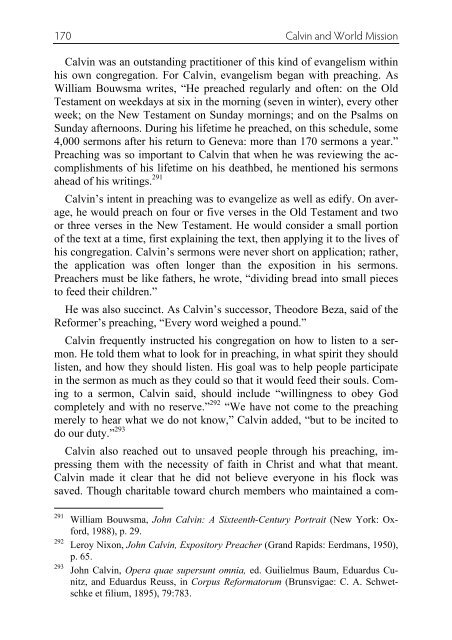Calvin and Missions - World Evangelical Alliance
Calvin and Missions - World Evangelical Alliance
Calvin and Missions - World Evangelical Alliance
Create successful ePaper yourself
Turn your PDF publications into a flip-book with our unique Google optimized e-Paper software.
170 <strong>Calvin</strong> <strong>and</strong> <strong>World</strong> Mission<br />
<strong>Calvin</strong> was an outst<strong>and</strong>ing practitioner of this kind of evangelism within<br />
his own congregation. For <strong>Calvin</strong>, evangelism began with preaching. As<br />
William Bouwsma writes, “He preached regularly <strong>and</strong> often: on the Old<br />
Testament on weekdays at six in the morning (seven in winter), every other<br />
week; on the New Testament on Sunday mornings; <strong>and</strong> on the Psalms on<br />
Sunday afternoons. During his lifetime he preached, on this schedule, some<br />
4,000 sermons after his return to Geneva: more than 170 sermons a year.”<br />
Preaching was so important to <strong>Calvin</strong> that when he was reviewing the accomplishments<br />
of his lifetime on his deathbed, he mentioned his sermons<br />
ahead of his writings. 291<br />
<strong>Calvin</strong>’s intent in preaching was to evangelize as well as edify. On average,<br />
he would preach on four or five verses in the Old Testament <strong>and</strong> two<br />
or three verses in the New Testament. He would consider a small portion<br />
of the text at a time, first explaining the text, then applying it to the lives of<br />
his congregation. <strong>Calvin</strong>’s sermons were never short on application; rather,<br />
the application was often longer than the exposition in his sermons.<br />
Preachers must be like fathers, he wrote, “dividing bread into small pieces<br />
to feed their children.”<br />
He was also succinct. As <strong>Calvin</strong>’s successor, Theodore Beza, said of the<br />
Reformer’s preaching, “Every word weighed a pound.”<br />
<strong>Calvin</strong> frequently instructed his congregation on how to listen to a sermon.<br />
He told them what to look for in preaching, in what spirit they should<br />
listen, <strong>and</strong> how they should listen. His goal was to help people participate<br />
in the sermon as much as they could so that it would feed their souls. Coming<br />
to a sermon, <strong>Calvin</strong> said, should include “willingness to obey God<br />
completely <strong>and</strong> with no reserve.” 292 “We have not come to the preaching<br />
merely to hear what we do not know,” <strong>Calvin</strong> added, “but to be incited to<br />
do our duty.” 293<br />
<strong>Calvin</strong> also reached out to unsaved people through his preaching, impressing<br />
them with the necessity of faith in Christ <strong>and</strong> what that meant.<br />
<strong>Calvin</strong> made it clear that he did not believe everyone in his flock was<br />
saved. Though charitable toward church members who maintained a com-<br />
291<br />
William Bouwsma, John <strong>Calvin</strong>: A Sixteenth-Century Portrait (New York: Oxford,<br />
1988), p. 29.<br />
292<br />
Leroy Nixon, John <strong>Calvin</strong>, Expository Preacher (Gr<strong>and</strong> Rapids: Eerdmans, 1950),<br />
p. 65.<br />
293<br />
John <strong>Calvin</strong>, Opera quae supersunt omnia, ed. Guilielmus Baum, Eduardus Cunitz,<br />
<strong>and</strong> Eduardus Reuss, in Corpus Reformatorum (Brunsvigae: C. A. Schwetschke<br />
et filium, 1895), 79:783.

















